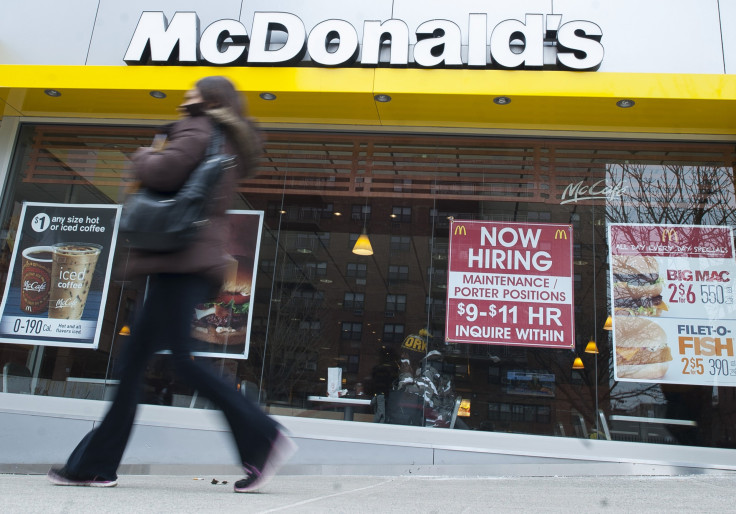McDonald’s (MCD) First Quarter 2014 Earnings: Profits Down On Cold US Winter, Strong Dollar, Weak Global Store Traffic

In the fast-food world, breakfast has lately gotten crowded -- bad news for McDonald's, which derives a fifth of its American revenues from sales of Egg McMuffins, hash browns and other morning fare.
Trouble capturing enough breakfast customers is expected to feature prominently in the report McDonald's Corp. (NYSE:MCD) plans to release before the markets open in New York next Tuesday, detailing its sales and earnings over the first three months of 2014.
Forecasts anticipate that the fast-food chain will report a 2.7 percent drop in net profit, to $1.24 billion, compared to the first quarter of 2013, according to analysts polled by Thomson Reuters. Earnings per share is expected to come in at $1.24 on revenue of $6.73 billion. For the quarter, the company’s stock price increased 1 percent to $97.24.
Harsh winter weather in the U.S., a stronger dollar and weakness in Europe and Asia have combined to limit prospects at McDonald's, the world’s largest restaurant chain by sales.
“The competitive environment remains challenging in the fast-food industry, particularly in the U.S., as chains compete for foot traffic in a still-soft retail environment,” Deutsche Bank analyst Jason West said this week in a research note. “MCD has significant exposure to foreign currencies (most notably the euro and U.K. pound), which could cause volatility in sales and earnings.”
Analysts also point to a menu that’s too big, and the company’s initiative to redesign prep tables for faster service isn’t expected to begin until late this year. Meanwhile, the 59-year-old Oak Brook, Ill., company is seeing only incremental traffic from its relaunched Dollar Menu, called Dollar Menu and More, while its premium Clubhouse Burger “may have fallen short of expectations,” according to Jeffries equity analyst Andy Barish. In March the company was forced to cut its Mighty Wings losses by dropping the price by 40 percent to unload millions of pounds of the chicken parts that didn’t sell as well as the company had expected.
The winter weather this past quarter that hit much of America kept many consumers away. U.S. same-store sales fell 3.3 percent in January, which offset increases in Asia, the Middle East and Europe, where sales grew between 2 percent and 5.4 percent. Globally, the sales increased 1.2 percent in January, but they declined 0.3 percent in February. Because the sales are in dollars, McDonald’s makes more from U.S. sales and franchise revenue from the 80 percent of stores that are independently owned. Traffic in the U.S. has the greater impact on the company’s financials.
Last year, same-stores sales grew only 0.2 percent, and the consensus shows the same for the first quarter of 2013. Same-store sales is a key measurement that excludes data from restaurants that have been open for less than a year and more accurately reflects general traffic to the company’s more than 35,000 restaurants.
As McDonald's struggles to attract consumers, it’s also facing a double team going after its $10 billion breakfast segment, where for decades the Egg McMuffin has helped the company retain the top spot in the breakfast niche.
Yum! Brands Inc. (NYSE:YUM), the Louisville, Ky., owner of KFC, Pizza Hut and Taco Bell, and Seattle’s Starbucks Corp. (NASDAQ:SBUX), have both added breakfast menu items to their roster in an attempt to grab some of the 30 percent U.S. market share McDonald’s has of the breakfast crowd. Yum’s Taco Bell chain added in late March waffle tacos, breakfast wraps and egg burritos to most of the company’s 3,700 U.S. restaurants. Starbucks also launched in March baked goods under the La Boulange brand and new breakfast sandwich items.
McDonald’s responded to these moves by offering free coffee in the first half of April and recently kicked off a new marketing blitz for its McGriddle pancake-muffin sandwich. If the company loses market share in this important segment, it will face pressure to renegotiate licensing and rental fees to it franchisers.
McDonald’s is facing some important challenges for its long-term growth, including its continuing inability to attract the growing ranks of younger health-conscious consumers. But with $89 billion in global sales, it would take a long time for the king of quick service to falter.
© Copyright IBTimes 2024. All rights reserved.












